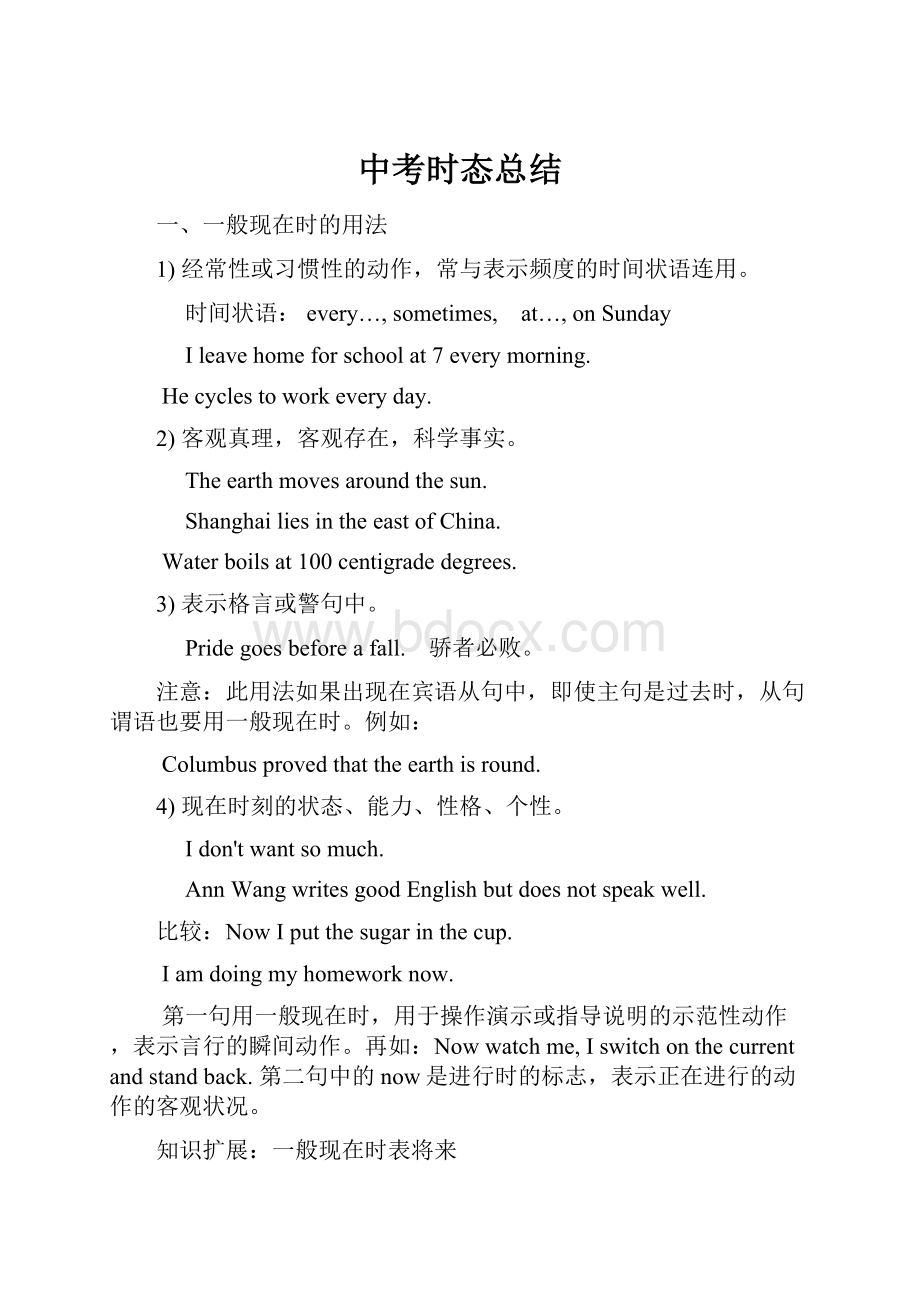中考时态总结.docx
《中考时态总结.docx》由会员分享,可在线阅读,更多相关《中考时态总结.docx(28页珍藏版)》请在冰豆网上搜索。

中考时态总结
一、一般现在时的用法
1)经常性或习惯性的动作,常与表示频度的时间状语连用。
时间状语:
every…,sometimes, at…,onSunday
Ileavehomeforschoolat7everymorning.
Hecyclestoworkeveryday.
2)客观真理,客观存在,科学事实。
Theearthmovesaroundthesun.
ShanghailiesintheeastofChina.
Waterboilsat100centigradedegrees.
3)表示格言或警句中。
Pridegoesbeforeafall. 骄者必败。
注意:
此用法如果出现在宾语从句中,即使主句是过去时,从句谓语也要用一般现在时。
例如:
Columbusprovedthattheearthisround.
4)现在时刻的状态、能力、性格、个性。
Idon'twantsomuch.
AnnWangwritesgoodEnglishbutdoesnotspeakwell.
比较:
NowIputthesugarinthecup.
Iamdoingmyhomeworknow.
第一句用一般现在时,用于操作演示或指导说明的示范性动作,表示言行的瞬间动作。
再如:
Nowwatchme,Iswitchonthecurrentandstandback.第二句中的now是进行时的标志,表示正在进行的动作的客观状况。
知识扩展:
一般现在时表将来
1)下列动词:
come,go,arrive,leave,start,begin,return的一般现在时表将来。
这主要用来表示在时间上已确定或安排好的事情。
Thetrainleavesatsixtomorrowmorning.
Whendoesthebusstar?
Itstarsintenminutes.
2)倒装句,表示动作正在进行,如:
Herecomesthebus.=Thebusiscoming.
Theregoesthebell.=Thebellisringing.
3)在时间或条件句中。
WhenBillcomes(不是willcome),askhimtowaitforme.
I'llwritetoyouassoonasIarrivethere.
4)在动词hope,takecarethat,makesurethat等后。
Ihopetheyhaveanicetimenextweek.
Makesurethatthewindowsareclosedbeforeyouleavetheroom.
二、一般过去时的用法
1)在确定的过去时间里所发生的动作或存在的状态。
时间状语有:
yesterday,lastweek,anhourago,theotherday,in1982等。
Wheredidyougojustnow?
IsawTominthestreetyesterday.
IboughtthisTVsetinBeijinglastyear.
2)表示在过去一段时间内,经常性或习惯性的动作。
WhenIwasachild,Ioftenplayedfootballinthestreet.
Healwayswenttoworkbybus.
Heusedtoactlikethat.
3)用过去时表示现在,表示语气委婉礼貌。
(1)动词want,hope,wonder,think,intend等。
例如:
Didyouwantanythingelse?
Iwantedtoaskyouaboutthat.
Didyouwanttospeaktomenow?
Iwonderedifyoucouldhelpme.
(2)情态动词could,would,例如:
Couldyoulendmeyourbike?
4)用在条件句中表示与现在或将来事实不符的虚拟语气。
IfIwereabird,IwouldflytoBeijing.
Ifhewereherenow,wecouldturntohimforhelp.
注意比较下列句型:
◎Itistimeforsb.todosth “到……时间了;该……了”,例如:
Itistimeforyoutogotobed. 你该睡觉了。
◎Itistimesb.didsth.“时间已迟了;早该……了”,例如:
Itistimeyouwenttobed. 你早该睡觉了。
◎would(had)rathersb.didsth. 表示“宁愿某人做某事”,例如:
I'dratheryoucametomorrow.
一般过去时表示的动作或状态都已成为过去,现已不复存在。
Christinewasaninvalidallherlife. (含义:
她已不在人间。
)
Christinehasbeenaninvalidallherlife. (含义:
她现在还活着)
Mrs.DarbylivedinKentuckyforsevenyears.(含义:
达比太太已不再住在肯塔基州。
)
Mrs.DarbyhaslivedinKentuckyforsevenyears.(含义:
现在还住在肯塔基州,有可能指刚离去)
三、一般将来时
1)shall用于第一人称,常被will所代替。
will在陈述句中用于各人称,在征求意见时常用于第二人称。
WhichparagraphshallIreadfirst?
Willyoubeathomeatseventhisevening?
2)begoingto+不定式,表示将来。
a.主语的意图,即将做某事或打算做某事。
Whatareyougoingtodotomorrow?
b.计划,安排要发生的事。
Theplayisgoingtobeproducednextmonth.
c.有迹象要发生的事
Lookatthedarkclouds;thereisgoingtobeastorm.
3)be+不定式表将来,按计划或正式安排将发生的事。
WearetodiscussthereportnextSaturday.
4)beaboutto+不定式,意为马上做某事。
HeisabouttoleaveforBeijing.
注意:
beaboutto不能与tomorrow,nextweek等表示明确将来时的时间状语连用。
begoingto/will的用法之比较:
用于条件句时,begoingto表将来,will表意愿。
例如:
Ifyouaregoingtomakeajourney,you'dbettergetreadyforitassoonaspossible.
Nowifyouwilltakeoffyourclothes,wewillfitthenewclothesonyouinfrontofthemirror.
☆beto和begoingto的用法之比较:
beto表示客观安排或受人指示而做某事。
而begoingto则表示主观的打算或计划。
例如:
Iamtoplayfootballtomorrowafternoon.(客观安排)
I'mgoingtoplayfootballtomorrowafternoon.(主观安排)
四、现在进行时
1.表示现在(指说话人说话时)正在发生的事情。
例如:
Wearewaitingforyou.
2.习惯进行:
表示长期的或重复性的动作,说话时动作未必正在进行。
例如:
Mr.Greeniswritinganothernovel.
(说话时并未在写,只处于写作的状态。
)
SheislearningpianounderMr.Smith.
3.表示渐变的动词有:
get,grow,become,turn,run,go,begin等。
Theleavesareturningred.
It'sgettingwarmerandwarmer.
4.与always,constantly,forever等词连用,表示反复发生的动作或持续存在的状态,往往带有说话人的主观色彩。
Youarealwayschangingyourmind.
知识扩展:
不用进行时的动词
1)事实状态的动词。
如:
have,belong,possess,cost,owe,exist,include,contain,matter,weigh,measure,continue
Ihavetwobrothers.
Thishousebelongstomysister.
2)心理状态的动词。
如:
know,realize,thinksee,believe,suppose,imagine,agree,recognize,remember,want,need,forget,prefer,mean,understand,love,hate
Ineedyourhelp.
Helovesherverymuch.
3)瞬间动词。
如:
accept,receive,complete,finish,give,allow,decide,refuse.
Iacceptyouradvice.
4)系动词。
如:
seem,remain,lie,see,hear,smell,feel,taste,get,become,turn
Youseemalittletired.
五、过去进行时
1)概念:
表示过去某时正在进行的状态或动作。
2)过去进行时的主要用法是描述一件事发生的背景;一个长动作发生的时候,另一个短动作发生。
3)常用的时间状语有:
thismorning,thewholemorning,alldayyesterday,fromninetotenlastevening,when,while
例句:
Mybrotherfellwhilehewasridinghisbicycleandhurthimself.
Itwasrainingwhentheyleftthestation.
WhenIgottothetopofthemountain,thesunwasshining.
型例题
1)Mary___adresswhenshecutherfinger.
A.made B.ismaking C.wasmaking D.makes
答案C.割伤手指是已发生的事情,应用过去时。
同时,when表时间的同时性,"玛丽在做衣服时"提供事情发生的背景,因此用过去进行时。
2)Asshe___thenewspaper,Granny___asleep.
A.read;wasfalling B.wasreading;fell
C.wasreading;wasfalling D.read;fell
答案B.句中的as=when,while,意为"当……之时"。
描述一件事发生的背景时,用过去进行;一个长动作发生的时候,另一个短动作发生。
句意为"在她看报纸时,奶奶睡着了。
"句中的fell(fall的过去时),是系动词,后跟形容词,如:
fallsick。
六.现在完成时态
1.用法:
①过去发生的动作对现在造成的影响或结果:
强调结果
E.g:
YesterdayIfinishedmyhomework,that’stosay,Ihavefinishedmyhomework
now.
②过去已经开始一直持续到现在的动作或状态:
强调继续
E.g.:
:
Ihavelivedheresince1990.
2.现在完成时的构成have\has+过去分词
3.现在完成时的四个基本句型
肯定句Hehasfinishedthework.
一般疑问句Hashefinishedthework?
否定句Hehasnotfinishedthework.
两回答Yes,hehas.No,hehasn’t.
特殊疑问句Whathashedone?
4.在下列情形下用现在完成时
(1)九词语
①already已经肯定句中或句尾
e.g.:
Ihavealreadyfoundmypen.
=Ihavefoundmypenalready.
②yet已经否定句和疑问句句尾
e.g.:
Ihavenotfinishedtheworkyet.
Haveyouboughtacomputeryet?
③ever曾经句中
e.g.:
Haveyoueverseenpandas?
④never从不句中
e.g.:
IhaveneverbeentoBeijing.
⑤just刚刚句中
e.g.:
Ihavejustdonemywork.
⑥before以前句尾
e.g.:
Ihaveneverbeentherebefore.
⑦sofar到目前为止
e.g.:
Sofarhehaslearnt200words.
⑧howlong多久
e.g.:
Howlonghaveyoulivedhere?
⑨howmanytimes多少次
e.g.:
HowmanytimeshashebeentoBeijing?
(2)两词组
havegoneto去了某地
e.g.:
HehasgonetoBeijing(去了北京)
havebeento去过某地
e.g.:
HehasbeentoBeijing.(去过北京)
(3)两结构
fortwomonths
for+一段时间
Jimhaslivedherefor2months.
sincelastyear
since+过去点时间
LucyhasbeeninBeijingsince3yearsago.
since3yearsago
since1990
sincehecamehere
since+过去时态句子
HehasbeeninChinasincehecamehere.
(4).如果句子里面没有时间状语,汉语意思能够加“已经”,往往用现在完成时态。
e.g.:
Haveyoulostyourlibrarybook?
你已经弄丢了从图书馆借的那本书吗?
(5).现在完成时态还常常用于下列句型
Theyhaveplantedmanytreesinthelastfewyears.
在过去的几年,他们已经种了很多树。
ThisisthebestbookIhaveeverread.
这是我曾经读过的最好的一本书。
ItisthefirsttimeIhaveplayedthecomputergames.
这是我第一次玩电脑游戏。
5.在现在完成时中,一次性动词不能和一段时间状语连用
e.g.:
Hehasboughtthebookfor3years.(错)
因buy这个一次性动词不能和一段时间for3years连用,改正的办法有五种:
①Hehasboughtthebook..(去掉一段时间for3years)
②Heboughtthebook3yearsago(改为一般过去时,使句子的意思不变)
③It’s3yearssinceheboughtthebook.
=3yearshaspassedsinceheboughtthebook.
(改为固定句型Itis---since---)
④Hehasnotboughtthebookfor3years.(改为否定句)
⑤Hehashadthebookfor3years.(用延续性动词have代替buy)
6.还有其他一次性动词也是这种情况,可参照前面的五种办法改正,前四种改法都一样,第五种改法各不相同,举例如下:
①come/arrive/getto/reach→behere
e.g:
Ihavecomeherefor3years.(错)改为:
Ihavebeenherefor3years.
②leave/go→beaway
e.g.:
Hehasleftfor3hours.(错)改为:
Hehasbeenawayfor3hours.
③begin/start→beon
e.g.:
Thefilmhasbegunfor3minutes.(错)改为:
Thefilmhasbeenonfor3minutes.
④open→beopen/close→beclosed
e.g.:
Theshophasopenedfor3years.(错)改为:
Theshophasbeenopenfor3years.
⑤die→bedead
e.g.:
Hisfatherhasdiedfor3years.(错)改为:
Hisfatherhasbeendeadfor3years.
⑥finish/end→beover
例:
Hehasfinishedtheworkfor3days.(错)改为:
Theworkhasbeenoverfor3days
⑦join例:
Ihavejoinedthearmyfor3years.(错)
改为:
Ihavebeeninthearmyfor3years.或Ihavebeenasoldierfor3years.
⑧buy/catch→have
e.g.:
Ihaveboughtthebikefor3years.(错)改为:
Ihavehadthebikefor3years.
Hehascaughtacoldfor3days.(错)改为:
Hehashadacoldfor3days.
⑨borrow→keep
e.g:
Ihaveborrowedthebookfor3years.(错)改为:
Ihavekeptthebookfor3years.
还有其它的归纳如下:
break→bebroken\getup→beup
marry→bemarried\become→be\lose→belost\
7.延续性动词和终止性动词
①延续性动词:
表示的动作是能延续的动作,这种动作可以延续下去或产生持久的影响。
e.g.:
learn\work\stand\lie\know\walk\keep\have\wait\watch\sing\read\
sleep\live
②终止性动词:
也叫非延续性动词,瞬间动词,一次性动词。
表示的动作不能延续,即动作发
生后立即结束,产生某种结果。
在有了某种结果后,动作就不能再继续下去。
e.g.:
leave\start\setout\arrive\reach\getto\begin\stop\shut\turnoff\
marry\put\puton\getup\wake\fall\join\meet\receive\finish\end\
complete\become\come\go\die\open\close\break\give\jump\buy\
borrow
8.终止性动词不能和一段时间状语连用。
Hehasdiedforthreedays.(错,终止性动词die不能和一段时间forthreedays连用)
七.过去完成时:
由had+过去分词构成。
用法有二:
①过去某一时刻或某一动作之前就已经发生的动作或存在的状态:
即过去的过去
e.g.:
:
Whenwegottothestation,thetrainhadleft.
当我到车站的时候,火车已经离开了。
Bytheendoflastweek,hehadlearnt1000words.
到上个星期尾为止,他已经学了1000个单
②过去某时间开始,一直延续到过去另一时间为止的动作或状态
e.g.:
:
HesaidthathehadmadeafewfriendssincehecametoChina.
他说自从他来中国,他已经交了几个朋友。
1.—Look!
Howwonderfulmycaris!
Oh,Jack.Whatareyouthinkingabout?
Don’tyoulikeit?
—I’msorryI______anyremarkaboutitintime.Icertainlythinkit’ssmart.
A.wasn’tmaking B.don’tmake
C.won’tmake